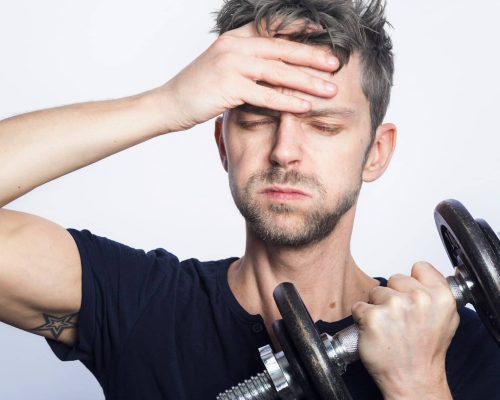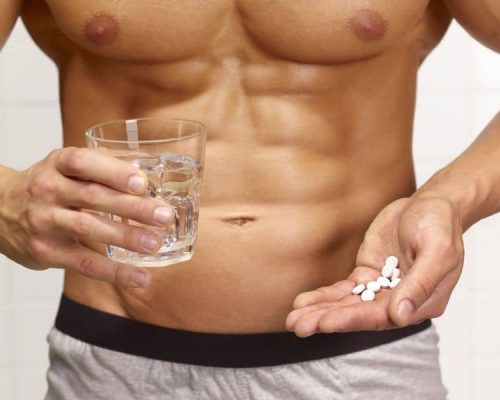Understanding Testosterone Boosters
What are Testosterone Boosters?
So, testosterone boosters? They’re basically stuff you can grab off the shelf aimed at jacking up your body’s testosterone levels. Folks use them hoping to kick low testosterone to the curb—stuff like feeling worn out, weaker muscles, or a libido that’s just not showing up to the party. But here’s the catch—not a ton of solid proof backing up their grand claims.
These magic pills often blend together vitamins, herbs, and other bits Mother Nature offers, with promises of cranking up testosterone. You’ll usually find stuff like fenugreek, zinc, maca, and ashwagandha hanging around in these boosters. Sure, they’ve been used in loads of cultures for ages, but science hasn’t given them the all-clear for truly boosting testosterone just yet.
Curious about what the fuss is? Swing by our complete guide on natural testosterone booster supplements for more deets.
Effectiveness of Testosterone Boosters
The allure of testosterone boosters can be pretty tempting, especially for dudes wanting to up their health game and performance. But don’t buy that hype train ticket too fast. According to some smart folks, yeah, they talk a good game, but these supplements don’t really have the scientific backing to show they really pump up testosterone levels or sort out low testosterone issues.
Here’s a quick rundown of what these ingredients claim versus what they actually do:
| Ingredient | Claimed Benefit | Scientific Evidence |
|---|---|---|
| Fenugreek | Boosts Libido | Not Much Proof |
| Zinc | Helps Make Testosterone | Toss-Up |
| Maca | Energy Boost | Eh, Not Really |
| Ashwagandha | Lowers Stress | Kinda Works |
Also, heads up: these boosters aren’t checked by the FDA in the same way your usual prescriptions are. So there’s a bit of a question mark over what’s in the bottle and if it’s even safe or up to scratch.
For more about the risks, have a look at our piece on testosterone booster side effects.
Before you make any moves, chatting with a doc might be a smart idea, and looking into other ways to naturally nudge up testosterone like tweaking your diet and lifestyle could be solid options. Trying out testosterone booster foods could be a straightforward way to get started.
By knowing the ins and outs of testosterone boosters, you can make smarter choices about your health. For reviews you can trust and expert opinions, check out our page on the best testosterone booster on the market.
The Role of Testosterone in Men
Testosterone’s that little hormone powerhouse in your world, guys. It keeps the wheels turning in your body, affecting all sorts of stuff that keeps you feeling good. Knowing what your testosterone’s up to helps you figure if you might benefit from a little boost.
Normal Testosterone Levels in Males
Just like your favorite song, testosterone levels have their ups and downs. They’re the hottest when you’re about 17, but they begin to take a slow slide down between 30 to 40. Don’t panic, this is pretty normal. By the time you’re hitting 70, your testosterone might drop around 30% from those youthful peaks, though it still chills in the normal range usually. See, WebMD backs me up on this.
Here’s what normal levels look like according to the American Urological Association:
| Age Range | Normal Testosterone Levels (ng/dL) |
|---|---|
| Adolescence (13-17) | 300 – 1,200 |
| 18-39 | 300 – 1,000 |
| 40-59 | 300 – 900 |
| 60+ | 300 – 700 |
Trying to keep testosterone levels top-notch? You might wanna check out some natural testosterone booster supplements or see what’s up with testosterone booster vitamins.
Causes of Low Testosterone in Men
When your testosterone pulls a disappearing act, things start feeling off. Sure, age does its thing, but loads of other stuff can kick your testosterone to the curb. Knowing what’s behind those low vibes can help you chase away issues like low libido, mood dips, and energy slumps. Check WebMD if you’re curious.
Common Causes:
- Aging: Testosterone peaks in the teen years and starts the downhill cruise as you hit the big 3-0.
- Medical Conditions: Stuff like obesity, diabetes, and those pesky chronic issues can mess with your testosterone.
- Lifestyle Choices: Eating junk food, being a couch potato, knocking back too many drinks, or stressing out – all these can mess with your mojo.
- Medications: Stuff like steroids and opioids might be to blame if your levels are tanking.
- Genetic Disorders: Things like Klinefelter syndrome throw a wrench in your hormone works.
Knowing why your testosterone’s low can help you tweak your habits—maybe hit up foods that boost testosterone naturally or try some natural remedies.
Stay in the know about your testosterone, and you’ve got a head start on exploring ways to beef it up, like trying the best testosterone booster for muscle gain. If supplements are your jam or you’re considering therapy, a chat with your doc is always a good move. Curious for more? Learn about low testosterone symptoms or how to get that natural jolt of energy here.
Ingredients in Testosterone Boosters
Thinking about trying out a testosterone booster? It’s smart to know what’s inside these handy supplements and how they work, especially if you’re on the hunt for the best testosterone booster for women.
Common Ingredients in Boosters
Many testosterone boosters mix and match natural goodies believed to boost testosterone. Here are some of the top hits:
-
Fenugreek: This herb is the rock star of testosterone supplements. A 2016 study says that guys taking 600 mg of fenugreek extract daily for 12 weeks saw their testosterone levels shoot up, along with improvements in sexual function compared to those who didn’t (Healthline).
-
Zinc: If testosterone had buddies, zinc would be a bestie. It’s crucial for testosterone production. A 2021 study with postmenopausal women sporting low zinc levels showed that extra zinc upped their testosterone and spruced up sexual function too (Healthline).
-
Maca: All the way from Peru, this plant is loved for boosting libido and fertility. But don’t bet the farm on it. Research hints it doesn’t push testosterone levels up much (Medical News Today).
-
Ashwagandha: This one’s a mouthful, but it’s pretty cool with its stress-fighting talent. Research finds that taking 600 mg of ashwagandha extract for 8 weeks can bump up testosterone levels by about 15% (Healthline).
Efficacy of Key Ingredients
Here’s a rundown of how these popular ingredients can help boost testosterone levels:
| Ingredient | Recommended Dose | Reported Benefits | Study Source |
|---|---|---|---|
| Fenugreek | 600 mg/day | Upped testosterone, better sexual function | Healthline |
| Zinc | Varies | Boosts testosterone levels, perks up sexual function | Healthline |
| Maca | Varies | Libido boost (little effect on testosterone) | Medical News Today |
| Ashwagandha | 600 mg/day | Raises testosterone levels, betters sexual well-being | Healthline |
These ingredients can be your partners in crime for a happy hormone team, but remember: your mileage may vary. Definitely chat with a health expert before jumping into new supplements.
Curious for more? Check out our reads on testosterone booster foods, natural testosterone booster supplements, and testosterone booster vitamins.
Misuse of Testosterone for Athletic Performance
Boosting your athletic game using testosterone boosters can be more trouble than it’s worth, with lots of health risks and rule-breaking issues to think about. Here, we’ll lay out the dangers of using testosterone boosters the wrong way and the rules in place to stop this.
Risks of Improper Use
Messing up your balance with testosterone boosters can cause some serious health problems. Sure, more testosterone might mean bigger muscles and better physical performance, but going overboard? That’s a whole other story. Using these boosters improperly can mess with your body’s hormone levels, bringing on some nasty side effects. Too much dependence on them and your body might slack off on its natural testosterone production.
Table 1: What Could Go Wrong with Misuse?
| What Could Go Wrong | What’s the Deal? |
|---|---|
| Hormone Imbalance | Throws off your body’s natural hormone balance |
| Cardiovascular Issues | Heart disease and stroke risks climb |
| Liver Damage | Liver toxicity and increased liver enzymes |
| Mood Swings and Psychological Effects | Risk of aggression, anxiety, and depression |
| Reproductive Problems | Reduced sperm count and possible infertility |
Want to learn more about side effects? Check out our detailed piece on testosterone booster side effects.
Anti-Doping Regulations
Using testosterone boosters the wrong way can get you in hot water with anti-doping rules, and that could cost athletes big time. The World Anti-Doping Agency (WADA) enforces strict rules against performance boosters. Testosterone boosters often make the banned list due to their possible performance-enhancing powers.
If caught, athletes might face long suspensions, disqualifications, and a hit to their reputation. These rules are there so the playing field stays fair and athletes stay healthy. For more on doping rules, check out Medical News Today.
While testosterone boosters have their place when used properly and under a doctor’s watchful eye, the dangers of misuse and the tight anti-doping rules are worth considering. If you’re aiming to naturally amp up your testosterone levels, think about safer routes like testosterone booster foods or natural testosterone booster supplements.
Understanding all of this can lead you to choices that are good for your health and keep you within the rules of the athletic world. For athletes wanting a performance boost that’s both legal and safe, natural and holistic approaches are the way to go. Check out what’s out there for natural testosterone booster remedies and supplements.
Regulation and Oversight of Testosterone Boosters
FDA Oversight
So, you’re thinking about testosterone boosters, huh? Here’s the scoop: the United States Food and Drug Administration (FDA) doesn’t babysit these supplements like it does prescription meds. Yep, you read that right. These over-the-counter wonder pills aren’t held to the same standard as the stuff your doctor prescribes (Medical News Today).
| Regulatory Aspects | Pharmaceuticals | Supplements |
|---|---|---|
| FDA Approval | Yep, needed | Nope, not needed |
| Safety Testing | Loads | Not so much |
| Efficacy Testing | Comprehensive | Not mandatory |
| Manufacturing Standards | Super strict | Can be all over the place |
Now, without these rule-heavy eyes watching every step, you’re risking it a bit. Safety, quality, and the actual kick you’ll get from these boosters? Not always a sure thing. Want a deeper dive on what might go wrong? Check our section on testosterone booster side effects.
Safety and Quality Concerns
The ‘no rules’ play could mean trouble in paradise when you’re eyeing testosterone boosters. Pay attention to these red flags:
- Ingredient Transparency: Manufacturers owe you nothing in terms of listing what you’re ingesting. Yup, could be a surprise party in every pill.
- Quality Control: With no rigid rules, quality’s like a box of chocolates. Watch out—contamination and inconsistency could be lurking.
- Misleading Claims: Some of these products could promise the moon but fall flat. Stick with trustworthy info and research.
| Safety Concern | Risk Level |
|---|---|
| Ingredient Transparency | Up there in red zone |
| Quality Control | High roller |
| Misleading Claims | Medium-sized headache |
Your best bet? Do your homework. Maybe even ring up your healthcare provider before kicking off any supplement shenanigans. Want more on that topic? Peek at our write-up about natural testosterone booster supplements.
And hey, if you’re curious about other testosterone booster adventures, we’ve got you covered on vitamins and energy boosts too. Check out testosterone booster vitamins and testosterone booster for energy.
Testosterone in Women’s Health
Testosterone Levels in Women
Let’s chat about testosterone in women. This hormone is sort of a big deal even though women produce it in smaller doses than men. It’s impressive to think that before menopause, women pump out around three times more testosterone than estrogen. But like it or not, age catches up, or maybe an oophorectomy gets in the mix, and testosterone levels can start to slide downhill.
| Age Range | Average Testosterone Level (ng/dL) |
|---|---|
| 20-29 | 15-70 |
| 30-39 | 10-60 |
| 40-49 | 7-60 |
| 50+ | 5-45 |
Now, when these levels drop, it’s not just “meh” vibes; you might notice things like:
- Feeling kinda down
- Dog-tired all the time
- Changes in, well, the bedroom department
- Your brain feeling foggier than usual
- Bones seeming to lose their mojo
- Muscles not pulling their weight
Need more scoop on those symptoms? Head over to our piece on low testosterone symptoms.
Use of Testosterone in Women
Here’s the lowdown on testosterone for women, especially those sailing through menopause. Adding a splash of testosterone might be just the ticket when other hormone therapies aren’t cutting the mustard, at least according to health folks like NICE and BMS.
Tossing testosterone into the mix can perk things up by:
- Sparking up the love life
- Boosting that “I can conquer the world” feeling
- Making urogenital and mental health say “thank you”
- Helping bones stand tall
- Keeping the brain sharp and moods in check
For those navigating hypoactive sexual desire dysfunction—yep, that’s a mouthful—testosterone could be the hero in your story: revving desire, arousal, and all things pleasurable while calming nerves around intimacy. Regular check-ins on how your body’s reacting and making sure you’re not overdoing it is the way to go.
Using low-dose, skin-applied testosterone seems to play nice with everything from blood pressure to lipid profiles, with no major flags in sight for short-term effects—though let’s keep it hush-hush for now regarding its use with breast cancer (NCBI).
Curious about more natural fixes? Check out testosterone booster natural remedies. And if your food game needs a testosterone-friendly upgrade, the testosterone booster diet plan could be worth a peek.










